Existing User Log In
New User Registration
Register for a free account to gain full access to the VGChartz Network and join our thriving community.



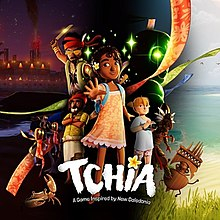

America - Front
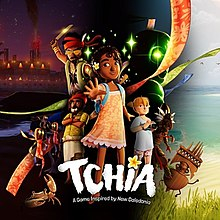

America - Back

Awaceb
Action-Adventure
 (Add Date)
(Add Date) (Add Date)
(Add Date) (Add Date)
(Add Date)
| Owners: | 0 |
| Favorite: | 0 |
| Tracked: | 0 |
| Wishlist: | 0 |
| Now Playing: | 0 |
Beyond the heavily-advertised inspiration of New Caledonia, Tchia (pronounced chi-ah) flexes its special identity in the prologue. As our protagonist with heterochromia sees her father being kidnapped, she reflexively reaches out, her left eye burns bright green, she teleports into the mysterious attacker's machete, and temporarily possesses it long enough to leave him with a lasting scar. While that inciting action succeeds at galvanizing anyone's attention after such a routine tutorial, French developer Awaceb isn’t primarily interested in players inventing new ways to use this power for combat; it's more about interfacing with the archipelago's varied fauna, wildlife, and cultures to your heart's content. And while that inspiration can be immediately understood, its design often diminishes that earnest intent.
After understanding the gameplay and narrative basics, it's only fitting for Tchia's tropical open world to showcase sailing. A quaint catamaran acts as the primary means of circumnavigating each primary and secondary island. Similar to the underappreciated Windbound, managing requires a tad more concentration: you can alter speed by adjusting the sail, but you have to take your hands off the rudder. It's not as simple as slowing down a propeller engine and steering in tandem; there's an extra analog step when cruising near reefs with treasure or narrow waterways. That ethos is carried into other things like only fast-traveling to unlocked docks and Tchia only having an impression of her location, versus an exact spot via GPS.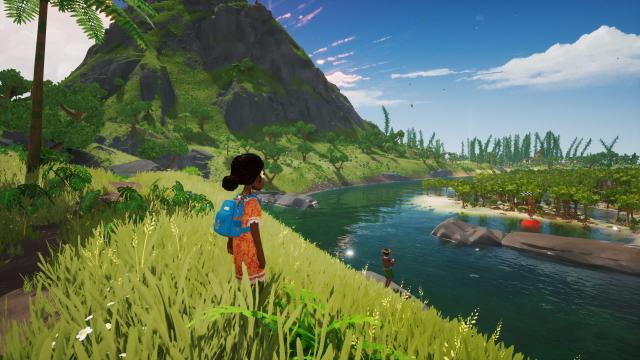
Locomotion mechanics dawdle an interesting middle ground between agile and floaty. The few instances of precision platforming aren't ideal, but the vast majority of movement is about steering towards a general direction. As with other Breath-likes, Tchia can scale practically any surface whilst managing a stamina meter. It's limited at first, but stat-boosting fruits are littered across the world and locked behind certain side quests. Outside of climbing, stamina is also tied to her glider and breathing underwater. There's a liberal borrowing of new Zelda’s foundation and ruleset that works in concert with its focus on exploration.
Where it truly stands out stems from her mysterious power. Recall that moment where Tchia possesses a machete for a few seconds. You see, she has this ability to "soul-jump" into various animals and objects. When entering slow-mo mode, your vision cone diminishes and the colorful world shifts to grayscale. Anything highlighted within the immediate area can be temporarily possessed, and there's a separate soul meter that can be similarly upgraded like stamina. It's a fun cheat sheet! You're free to manually scale a steep incline or hijack a nearby bird to reach the peak in no time. There are creative ways to leverage soul and stamina meters in tandem too: ping-pong between your replenishable oxygen and soul meters to explore the more of the ocean’s depths for longer periods.
This confection between Breath of the Wild's movement framework and Super Mario Odyssey's possession mechanic is utilized within New Caledonia in fun ways. Coconut trees operate like rubbery trebuchets, virtually each item stuffed in your backpack can be possessed, and each soul-jumped animal has one special ability that ranges from humorous to useful for a potentially hidden treasure or trinket. And Tchia's laidback tone makes interacting with the world for its own sake part of the engagement. Where players ask "why be able to possess a useless wood pallet?" Awaceb retorts with "why not?" There's an invisible-yet-tangible imposition on players to maximize their time within this serene locale, testing the physics-based simulations of jumping, sliding, gliding, swimming, and so on at their own pace.
New Caledonia itself invites that steady pace in a way other open worlds lack. The emphasis on contrast works to its favor. When the prologue concludes and you're finally able to drink in the immense scope and scale of the gleaming water and nearby isles, it skillfully guides you towards the island’s main city. Of course you're free to travel anywhere, but Tchia has to meet with Caledonia's prefect, the wormlike god Meavora, to progress the main plot. Outside of the paved city roads and skyscrapers, a few other factories are strategically placed across the southern island; conversely, the northern island has a denser jungle with a mountainous spine practically slicing it into two halves. Little topographical distinctions to a specific area, be it ashen soil or special landmark, do a great job of visually spoiling you. It’s a tough task to make a game world's geography implicitly rewarding to traverse on its own and Awaceb handedly succeeded here.
Complimenting this core are other ancillary activities. Some like slingshot target practice or races are fun distractions, while others expand Tchia's capabilities. Specific spots have rock-balancing mini-games that'll unlock new songs for Tchia's ukulele, enabling her to summon special animals or objects, or even alter the time of day. Likewise, expanding Tchia's soul meter requires you carve wooden totems to a stone door's specific demands – altering its teeth, eyes, and so on – to unlock it. Most main quests are bookended with a jam session: whether it's with her ukulele, dried grass, or something else, you're playing a fun & challenging rhythm section (without a fail state). While they're completely skippable for accessibility's sake, you'd be missing the game's best moments of infusing mechanics with culture.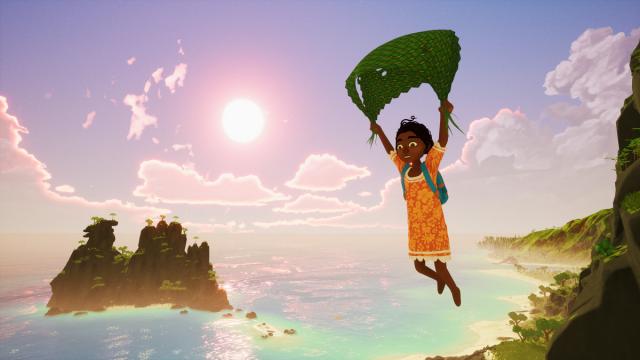
Foundationally, it's a strong elevator pitch. The way these elements meld together, mixing a casual atmosphere with a degree of pre-planning, can be exciting when the archipelago opens up. And then the momentum starts to slow down. The open world design becomes more interested in using Ubisoft's item chickenpox to maintain attention above all else. I don't want to be dismissive of having a plethora of stuff as a fault by itself, but there's a threshold to when scores of cosmetic baubles filling a pie chart gets so tiring. Seeing x/180 braided trinkets, x/80 underwater pearls, x/95 valuable chests, and more on her map makes me intuit these items as jingling keys over exploring the world in more dynamic & interesting ways. The archipelago starts to feel more empty.
Lassitude with this stagnant design is exacerbated when the second half makes combat a mainstay. Meavora has enslaved Tchia's father and numerous other innocents. The main goal is essentially Far Cry against sentient fabric people: clear out any cloth guards in your way and cut the facility's powerline. There's some initial gratification in soul-jumping into a jerry can, an oil lamp, or an explosive rock and hurtling it towards them, watching the incendiary results against these fabric flunkies, but it quickly wears out its welcome. There'll be a breaking point where it's best to stock up on explosives, shove as many as you can in the backpack, and just throw these at them. It's ironic how combat turns Tchia's key feature into pure tedium.
Beyond the bland & repetitive route taken, its rules feel too loosey-goosey. The textile minions have such a wonky detection system; even when they give chase, their only form of attack is wrapping you like a half-opened present. It's reminiscent of that Family Guy skit making fun of the cellophane emblem Superman threw at Zod:
"Ah! I lost some stamina for two seconds and had to button-mash to free myself."
"Take that! Slowed you down!"
"Wow. Yeah, that really inconvenienced me."
They're more of an inconvenient pest than true enemies. And since I have an urge to fully clear out enemy camps like this (past the point of boredom), it felt like an unremitting slog. While Tchia can stealthily navigate these factories and not have to torch every guard in sight, it's in her best interests to scour and destroy all fabric piles for big stamina fruits. There's still an incentive to trudge through its soporific combat/stealth systems.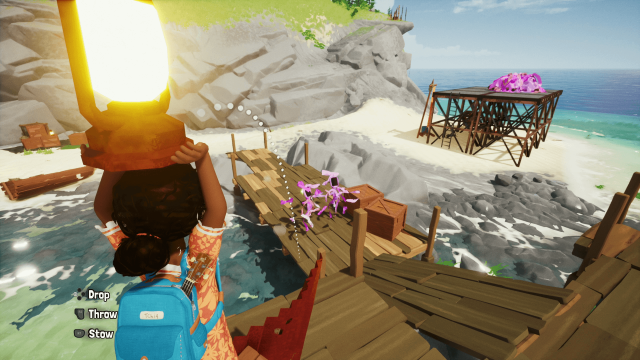
Perhaps the lynchpin that exacerbates these gripes stems back to the dull mission structure, for both the golden path and critical side content. For a game about seeking out new wildlife and objects to inhabit, you'd think the main quest would frame objectives around that. There's only one instance I recall on the golden path where Tchia had to possess an animal to acquire a special offering item. It was a cute little semi-puzzle with a satisfying "a-ha!" moment, but it was a short high. Where's the main story beat of saving someone as a dolphin or bombarding a bully with bird poop? Great potential that’s rarely ever tapped.
Even when considering these faulty pillars – along with launch-window gripes like a sporadically wonky framerate - I can fully understand those complaints doing little to fans’ collective enthusiasm; after all, if you're ensorcelled by the beautiful world and want to soak in every square inch and nab every collectible, that's a far higher percentage of time spent with its better elements. Two different people are playing two uniquely different games depending on being a completionist (over 20 hours) or focusing on the golden path (7-9 hours). Since the warm vibe and lush scenery feels less… coercive than the standard Ubisoft checklist, there's an argument to be made how Tchia's routines feel more substantial by contrast.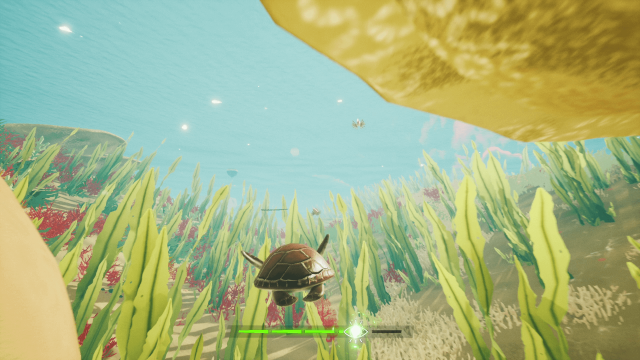
"Substantial" is a tougher argument to make for the modest story though. Although the local folklore that inspired it has some flavor, I could never gauge what Writer/Director Phil Crifo was ultimately going for. Imagine a magician shuffling cards and saying "pick a tone, any tone!" to the audience. Surprisingly dark moments are often undercut by oddball gags that don't stick, like a discount Taika Waititi flavor of storytelling. Even when considering the better moments, the narrative feels like a short story or novella stretched to its limits. The allegedly emotional beats can't carry much oomph! since so little time has been spent on characterization to begin with.
Awaceb still squeezes much out of this slim script through delightful presentation. John Robert Matz's soundtrack immediately ranks as one of my early favorites for this year, utilizing some offbeat instruments and choir singers in creative ways. A large part of what made every rhythm mini-game a nice treat was a new track accompanying it, which also reflected the subtle differences between native tribes. Although not leveraging an insane amount of detail, the audio/visual design works well for this approach. The Play-Doh character textures can tend to look similar, but enough work was done to avoid Fortnite knock-off accusations; plus, the soft-texture approach offsets insane technical demands for its stunning draw distances. 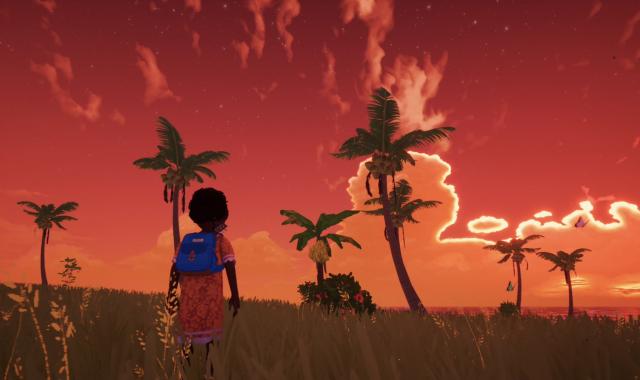
All told, Tchia feels like a tale of mismanaged contrasts: the easygoing island exploration's tailwind becoming blunted by the design's headwind. The skeleton of a richly-detailed wildlife & physics simulation is an admirable feat for such a small team, but it then over-emphasizes poor qualities like combat; that said, since there's a clean split between better and lesser templates I can appreciate some players adoring this experience. It personally leaves me going in multiple directions, like Tchia's dinghy being tossed back and forth in open waters. Awaceb harnessed Caledonian culture in numerous ways, but it most strongly resonated with me during sporadic rhythm segments rather than when interacting with the wider world.
Contractor by trade and writer by hobby, Lee's obnoxious criticisms have found a way to be featured across several gaming sites: N4G, VGChartz, Gaming Nexus, DarkStation, and TechRaptor! He started gaming in the mid-90s and has had the privilege in playing many games across a plethora of platforms. Reader warning: each click given to his articles only helps to inflate his Texas-sized ego. Proceed with caution.









